Make Your Own All-Purpose Cleaner: 10 Simple DIY Recipes

Have you ever thought about making your homemade all-purpose cleaner? Tired of trying all the expensive cleaning detergents that simply don’t deliver as promised? Are you afraid that what you use might harm you and your family in the long run?
Well, stay tuned because I will provide a step-by-step guide that will change the way you clean your house with just a few simple ingredients that you can grab from your kitchen cabinet.
What Is An All-Purpose Cleaner?
Simply put, an all-purpose cleaner is gentle and non-abrasive yet effective enough to remove stain, dirt, and grease that can be used on a vast majority of materials, from marble, plastic, steel, wood, to other types of surfaces.
All-purpose cleaners can be categorized into 3 different types – disinfectant, heavy-duty/degreaser, and mild/gentle all-purpose cleaner for everyday cleaning.
There are no specific “standards” when it comes to formulating your homemade all-purpose cleaner. Different formulas with different ingredients give unique cleaning power and results.
Why Should You Opt For A Homemade All-Purpose Cleaner?
This section will focus on analyzing the harmful effects of common toxic chemicals used in commercial products, and the non-toxic alternatives that you can use to make do-it-yourself all-purpose cleaners at home.
Harmful Toxins That They Don’t Tell You At The Supermarkets

Have you ever wondered about what exactly is inside those shiny packages sworn by companies that will deliver miraculous results to your house? Good thing you’ve asked because here’s why:
Cleaning agents (below) used in the formulation process of commercial cleaners are destructive to the continental government organs, neural system and carcinogenic when extendedly exposed.
- Ethoxylated alcohol – containing extremely toxic ingredients known as ethylene oxide and 1,4 dioxane. Both of the ingredients have proven to be “carcinogenic to humans” (cause cancer).
- Formaldehyde – typically used in heavy duty cleaning products. This ingredient has been linked to the onset of ALS (amyotrophic lateral sclerosis) – a neurodegenerative disease that gradually takes away the brain’s ability to control the body.
Formaldehyde also shifts chemical balance in the body, leading to adverse health consequences such as mood swings, depression, headaches, insomnia, irritability, and brain deficit.
- 2-Butoxyethanol – a common ingredient in commercial all-purpose cleaners and window spray. Extended exposure to the chemical leads to high-grade liver, kidney damage, narcosis and pulmonary edema.
- Ammonia – works wonder at leaving shiny and streak-free windows and glasses. However, prolonged exposure can lead to severe damage to your mucous membrane and cardiovascular system.
- Sodium Hydroxide – foundinheavy duty cleaners such as oven cleaners, clog removers…etc. Mild skin contact or inhalation can lead to a burning sensation in your throat and skin irritation that lingers for days after exposure to sodium hydroxide.
- Chlorine – scouring powder, laundry whiteners, toilet bowl cleaners, mildew removers…etc. Extended exposure can lead to disruption in thyroid function, irritated skin and chronic skin dryness.
Your Must-Have Homemade Cleaning Essentials

As mentioned above, there is no one perfect technique for making a homemade all-purpose cleaner. Each ingredient is effective in its own right and serves a different purpose. There are 4 simple, safe, time-tested cleaning agents you should stock up in your pantry:
- Distilled White Vinegar – thanks to its acidic nature, vinegar is hailed as a natural cleaning agent that works wonders at dissolving stubborn grease, grime, and mineral deposit. It can also kill certain household germs at an affordable price tag.
It can also remove coffee and tea stains very well. However, it is typically sold at 5% concentration, but for more effective results, you should opt for those with a higher concentration.
- Rubbing/Isopropyl Alcohol – popularly known for making things shiny without leaving watermarks. Glass, mirrors, chrome, stainless steel…etc, you name it. Rubbing alcohol can restore and make your house shiny new with just a few swipes.
- Baking Soda – is my go-to scouring powder and natural deodorizer. It is powerful at removing encrusted deposits and grease on hard surfaces, like ceramic tiles, pots, pans, baking trays, grills, porcelain sinks, bathroom fixtures…etc.
- HydroPeroxide – has been proven as a safe type of chemical for household use. It is perfect for breaking down hard-to-remove molds, such as caps of water bottles, fridge seals, bloodstains, and making tile grout cleaning super easy.
- Borax – otherwise known as sodium tetraborate, a white powdery mineral (alkali), great for cutting grease, oil, and dirt. It also gets rid of stains, molds, and mildew around the house, is used as a safe whitening agent for clothes, neutralizes odors, and kills insects.
- Castile Soap – Authentic castile soap is a concentrated plant-based soap from vegetable oils. It is natural, non-toxic, and safe for sensitive skin, pets, and cleaning purposes.
- Essential Oils – adding essential oils is a great way to enhance aromas in your cleaning solutions. Certain oils have antibacterial properties and are fantastic for repelling insects, such as rosemary, lavender, eucalyptus, peppermint, lemongrass.
Now that you have got all the essential tools and information, let’s dive right into how to make your homemade all-purpose cleaner, shall we?
7 Versatile Homemade All-Purpose Cleaner Formulas
Okay, so now that you’ve nailed the vital info, let’s quickly move to how to make your homemade all-purpose cleaners. These recipes are versatile and are designed to suit your different needs and preferences. Let’s dive into it, shall we?
1. Homemade Heavy-Duty All-Purpose Cleaner

This particular formula is versatile and has proven its effectiveness many times, especially when it comes to tough cleaning jobs, including grease, encrusted deposits in kitchen tools (trays, ovens, pots, and pans), stubborn buildups in sinks, toilet bowls.
What You Need:
- 1 tablespoon of Borax
- 3 tablespoons of hot tap water
- 1 tablespoon of Baking Soda
- 20-30 drops of natural dish soap
- 2 cups of 3% Hydrogen Peroxide
- 20 oz spray bottle (if you have a different size bottle, adjust the ratios accordingly)
- 30-40 drops of essential oils (optional)
Mixing Instructions:
- Step 1 – Put 1 tablespoon of Borax and pour 2 tablespoons of hot tap water in a bowl. Whisk the mixture with a fork.
- Step 2 – Add 1 tablespoon of baking soda and another tablespoon of hot tap water into the mixture and whisk well until blended.
- Step 3 – Add the rest of the ingredients – dish soap, Hydrogen Peroxide and essential oils. Pour the mixture into the spray bottle and shake well before each use.
You can see this video to know more:
Notes:
- Make sure to do steps 1 and 2 in quick motions so the concoction is dissolved properly as Borax will harden and become crusty if it sits for long. Make sure to shake well before each use.
- If the stains/encrusted deposits have been built up for a long time, I recommend applying the cleaner in a generous amount and leaving it for 15-20 minutes. Then use a heavy-duty scrub sponge to clean the surface thoroughly.
2. Homemade All-Purpose Cleaner With Vinegar

This formula is the best choice, it’s perfect for everyday general cleaning and will ensure your house is squeaky clean using everyone’s favorite cleaning ingredient – vinegar. Here’s how you can make it:
- ½ cup of distilled vinegar
- 10 drops of essential oils (I suggest using tea tree, lavender or lemon)
- 1 cup of Baking Soda
- One 12oz spray bottle
Instruction:
- Step 1 – Mix the distilled vinegar, essential oils with a little bit of water before adding baking soda in a sterilized/clean (preferably) glass spray bottle).
- Step 2 – Fill water up to the top.
- Step 3 – Shake gently, spray and wipe with a clean cloth.
3. Homemade All-Purpose Cleaner Without Vinegar

I get it, vinegar is not everyone’s cup of tea. Although it is a powerhouse when it comes to home cleaning, most people find its odor quite unpleasant.
Furthermore, if your home is filled with natural stones, such as marble and granite, you SHOULD NOT be using acidic substances, such as vinegar in your homemade cleaner as it can seriously damage these precious stones.
Therefore, I will show you in detail how to make an all-purpose cleaner without vinegar. It’s easy to make and does not linger unpleasant scent around your house. The ingredients involved are:
- 1 teaspoon of Castile soap
- Approximately 1 ½ cup of (preferably distilled) cold water
- 2 teaspoons of baking soda
- One clean spray bottle
Instructions:
- Step 1 – Place the baking soda into the spray bottle
- Step 2 – Pour 1 cup of (distilled) water into the bottle
- Step 3 – Shake vigorously till the baking soda is fully dissolved (takes about 1 minute)
- Step 4 – Add the Castile soap and swish gently in a circular motion to combine all the ingredients (remember only to do it gently, so the solution is slightly cloudy).
- Step 5 – Pour the remaining ½ cup of (distilled) water into the solution.
- Step 6 – Spray the mixture onto the surface and clean using a fresh cloth.
Note:
- Castile soap can sometimes leave white streaks on certain surfaces. To combat this issue, use a clean damp cloth to wipe it.
- Gently swish it every time before use to take away the solution separation.
4. How To Make All-Purpose Cleaner Using Citrus Peels

This may come as a surprise, but citrus peels don’t necessarily have to be thrown in the bin straight away. As the matter of fact, the rinds of citrus fruits do have antibacterial properties and can actually be infused to create a non-toxic, natural all-purpose cleaner.
To prepare:
- Distilled white vinegar
- 1 quart of tightly packed citrus peels (can be lemon, lime, clementine, grapefruit or orange)
- Water
- Citrus essential oils (I prefer using lemon oil for its antibacterial properties)
- One clean glass/Mason jar
- One glass spray bottle.
To make:
- Step 1 – Pack the citrus peel tightly into a glass/Mason jar, fill it up with distilled white vinegar and place the jar in a sunny area to let the ingredients infuse properly for 2 weeks.
- Step 2 – After 2 weeks, strain the vinegar and discard the peels. Use a glass spray bottle and pour the infused vinegar (use a funnel to help).
- Step 3 – Pour 2 cups of water and add 20 drops of (lemon) essential oils. Shake well.
- Step 4 – To use, spray the mixture onto the wanted areas and clean with a damp cloth.
You can see this video to know more:
Note: DO NOT use this mixture on natural stone surfaces such as marble and granite, as the acidity in this formula will corrode and damage the texture of the surface.
5. DIY All-Purpose Cleaner With Alcohol

This recipe is excellent for general antibacterial and viral cleaning. Vodka is the star of this recipe (you substitute it with rubbing alcohol if you don’t have vodka). Pay attention when using natural stone surfaces. Making this recipe easy, simply follow the instructions below.
To prepare:
- Hot water
- Vodka
- A (glass) spray bottle
- White vinegar
- 30-50 drops of essential oils (I prefer using tea tree, cinnamon, and thyme for antibacterial & to create a pleasant aroma that can cancel out the harsh alcohol scent)
To make:
- Step 1 – Fill ⅓ of the spray bottle with vodka and another ⅓ with hot water.
- Step 2 – Fill the remaining ⅓ with white vinegar, then add the essential oils into the mixture. Shake vigorously.
- Step 3 – Spray onto the surface and wipe with a fresh cloth.
6. Natural All-Purpose Disinfectant Using Essential Oils

Apart from their oh-so-amazing aromas, adding essential oils into your cleaning regimen can disinfect and sanitize surfaces, preventing bacteria from breeding and spreading. To make a general everyday all-purpose cleaner, just follow the recipe below.
Ingredients:
- 20 drops of essential oils (if you’re looking for antibacterial properties, then opt for citrus and tea tree oils).
- 2 cups of water
- ½ cup of distilled white vinegar
To make:
- Step 1 – Pour all the ingredients in a sterilized glass spray bottle.
- Step 2 – Gently swirl the mixture and spray directly onto the surface (again, be mindful when using vinegar on natural stone surfaces).
7. DIY All-Purpose Cleaner With Liquid Dishwashing Soap

If you’re a busy and always on-the-go type of person, and just want to resort to readily available kitchen products to clean your house, then keep reading because this recipe is so easy and would literally take you less than 5 minutes from start to finish.
Use:
- ¼ cup of white vinegar
- 2 tablespoons of liquid dishwashing soap
- Hot water
- A spray bottle
Let’s make it:
- Step 1 – Measure the liquid dishwashing soap and add ¼ cup of white vinegar into the spray bottle.
- Step 2 – Fill the bottle with water and shake thoroughly but gently to combine the ingredients.
- Step 3 – Spray directly on the areas you want to clean. Wipe with a clean cloth.
You can see this video to know more:
What Is The Expiring Date For DIY All-Purpose Cleaners?
The answer is it varies from recipe to recipe. Certain ingredients go bad quickly/more frequently than others. These ingredients are:
- Fruits – such as lemon, orange peels…etc.
- Water – water breeds life, and that also includes bacteria and molds.
- Preparation with hydrogen peroxide.
Other ingredients, though they are not preservatives; however, also help prolong the shelf life of your DIY cleaning solutions:
- Borax
- Rubbing alcohol
- Essential oils
- Vinegar
- Salt
Typically the time window for using homemade cleaners is between 2-4 weeks. Always check through observation and smell to determine if the solution is still good to use.
Tips For Prolonging DIY All-Purpose Cleaner Shelf Life?
There are 6 tips that you can use to extend the shelf life of your homemade cleaning solutions. Let’s take a closer look:
- Make your batch small so the solutions run out before they even go bad.
- Keep your DIY cleaner away from heat and sunlight (preferably in a dark, cool place such as the refrigerator or in a cabinet).
- Use distilled/boiled water instead of tap water.
- Clean and sterilize the containers/spray bottle very well so the solution is not contaminated with bacteria from the start (I recommend using a glass bottle).
- Use essential oils that have a longer shelf life. Citrus typically have a shorter shelf life.
- Use distilled white vinegar instead of regular vinegar to prolong the cleaner shelf life.
To Learn About How To Make Your DIY Products Last Longer. You can see this video to know more:
FAQs
If you still have questions in regards to your homemade all-purpose cleaner, check out the 5 commonly asked questions below to get more informative guidance.
Cleaning Your Home Has Never Been Easier
Thanks to all these household staples ingredients, cleaning your home and clean living has never been easier. With just a few inexpensive ingredients, you can make your home shiny new without worrying about all the toxic chemicals harmful to your family’s health.
Another great thing about making your DIY cleaning formulas is that there is no right or wrong. You can adjust the ratios and mix up the ingredients that you find works best for you. Please let me know what you think, and stay tuned for more exciting DIY recipes.

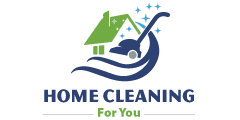
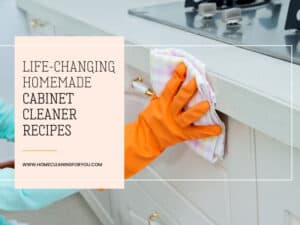
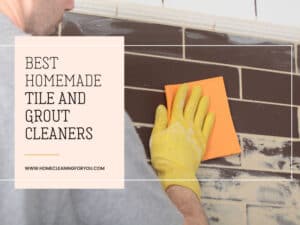
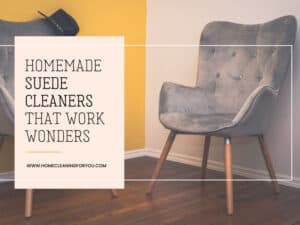
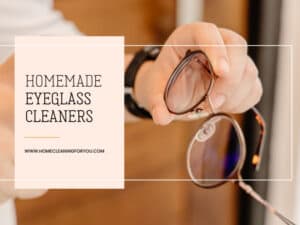
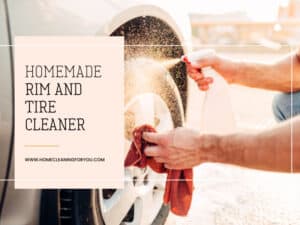
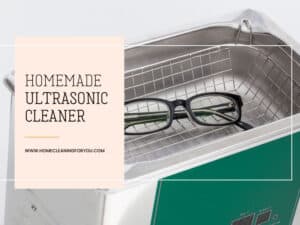
Samantha Lee
Head Cleaning Expert
Expertise
Professional Home Cleaning, Green Cleaning Techniques, Stain Removal & Fabric Care, DIY Home Maintenance & Organization, Sustainable Cleaning Products, Home Care for Busy Lifestyles
Education
University of Denver
Samantha Lee is the Head Cleaning Expert at HomeCleaningForYou.com, specializing in eco-friendly home care. She holds a Bachelor of Science in Environmental Science from the University of Denver, focusing on sustainable cleaning solutions.
With expertise in green cleaning, stain removal, and DIY home maintenance, she helps homeowners keep their spaces fresh and chemical-free. Samantha has been featured in lifestyle publications and has partnered with brands promoting natural cleaning products.
She also shares practical tips through her blog, online courses, and workshops. Passionate about sustainability, she enjoys testing new eco-friendly cleaning methods and spending time outdoors.